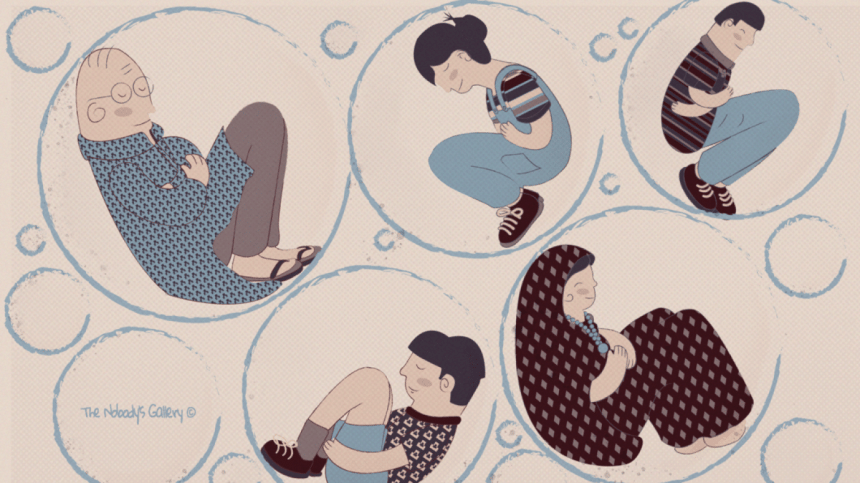You cannot convince me that the pandemic has not been hard on everyone

On some level, the pandemic weighs down on every single human being - those of us who are still fortunate enough to live through these times. There continues to be people whose actions (or inactions) directly contribute to the loss of innumerable lives. I have not yet been able to process the mindset they have or where they are coming from. All I know is that I am prompted to withhold my judgement (at least for the anti-vaxxers and the people denying the pandemic, not for the reckless partiers and travellers). The existence of this group of people serves as yet another reminder or blatant proof of the failings of modern society, especially because of its ever-increasing polarisation.
If we are to search for the silver lining in every situation - more as a mechanism to survive and less as an automated response of a culture obsessed with positivity - we will find examples of many people for whom the pandemic has turned out to be a blessing in disguise. I struggled to use these particular words to describe a situation that is so hellish for so many. In fact, even as a general philosophy, I've resisted the pressure to put a positive spin on the things in my life that have led to great discomfort, pain and loss. It seems unfair and a gross misrepresentation to derive pleasure/joy from something that comes with such a heavy price tag. I worry that this line of thinking directly results in the complacency that allows us to tolerate abuse and systemic oppression. However, in recent days, I have come to question my own inhibitions to finding silver linings.
I have come to realise that for most people, the need to find beauty in the ugly, the good in the bad does not simply stem from a place of denial. As long as we hold space and acknowledge the wrongdoing or the harmful aspects of a situation (and this is not easy to do), as human beings it has almost become a fundamental right for us to be able to find a break in the clouds. Our survival and wellness have come to depend on it.
For thousands across the world, the pandemic has presented an opportunity to do things they have always wanted to do, or spend valuable time with loved ones. People have saved countless hours in commute, been able to adopt more flexible work schedules and make time for hobbies. For many, the pandemic has also served as a time of reckoning, with many millennials deciding to quit their jobs and finally pursue their passion projects or simply a much slower-paced life. For others, the unique conditions of the pandemic have presented opportunities to start specialised businesses, grow their existing business as remote work has increased, etc. People have found their soulmates, fallen in love and gotten married. For a large number of people, lives have continued according to their plans, if not better and it is about these people specifically, that I want to make a point.
When asked how their lives have been going throughout this year and a half, many are quick to express how grateful they are. While for some, the gratitude is genuinely felt, others may be using gratefulness as a crutch. This response is only natural as collectively, our strategy to deal with any difficult situation is to focus on the positives. What that does is create a population of emotionally stunted, un-self aware people, the majority of whose needs remain unmet. This leads to frustration and a lower quality of life, and sometimes worsens mental health and depression.
What I am trying to say is: even if life is going well for you in most departments, if you are able to check all the boxes on the imaginary list of things which are supposed to make up a good life, you are still allowed to feel completely strung out by the experience of living through this pandemic. I would argue that even those who believe that life has been nothing short of blissful for them during this historic period, have much to process on a psychological and spiritual level. This concern arises because of the prevalence of intergenerational trauma that is interlinked with a collective penchant to brush the messy parts of life under a rug and never to lift it again.
As the coronavirus viciously and mercilessly mutates, wreaking havoc on lives all across the world, human beings are faced with the chance to reckon with themselves. After all, it is not just the pandemic that is a sign of a failing civilisation but also the occurrence of years of political and systemic injustices boiling over, and unprecedented climate catastrophes. Amidst all this, there is no shortage of proof that the way humans have run this planet according to pre-established standards does not work. While much may seem to be out of our control, the way we process grief and loss - the defining pillars of a wildly infectious and fatal disease - isn't. I hope that we can all give ourselves grace, acknowledge that it's been a struggle, that we have felt suffocated even if all our physical needs were met.
The author is a freelance journalist who enjoys books, movies, and art. Email: [email protected].

 For all latest news, follow The Daily Star's Google News channel.
For all latest news, follow The Daily Star's Google News channel. 




Comments